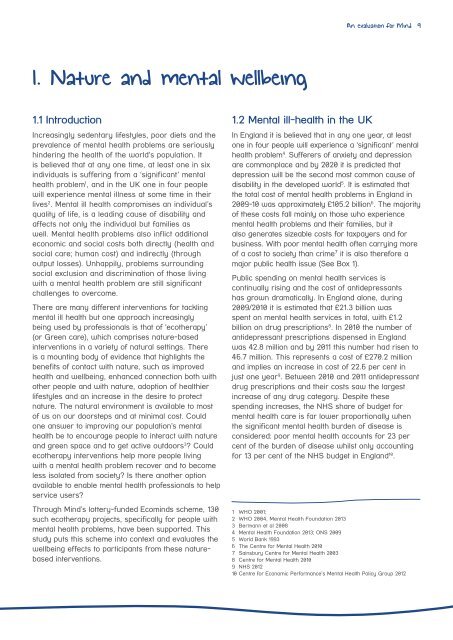Ecominds-effects-on-mental-wellbeing-evaluation-report
Ecominds-effects-on-mental-wellbeing-evaluation-report
Ecominds-effects-on-mental-wellbeing-evaluation-report
Create successful ePaper yourself
Turn your PDF publications into a flip-book with our unique Google optimized e-Paper software.
An evaluati<strong>on</strong> for Mind 91. Nature and <strong>mental</strong> <strong>wellbeing</strong>1.1 Introducti<strong>on</strong>Increasingly sedentary lifestyles, poor diets and theprevalence of <strong>mental</strong> health problems are seriouslyhindering the health of the world’s populati<strong>on</strong>. Itis believed that at any <strong>on</strong>e time, at least <strong>on</strong>e in sixindividuals is suffering from a ‘significant’ <strong>mental</strong>health problem 1 , and in the UK <strong>on</strong>e in four peoplewill experience <strong>mental</strong> illness at some time in theirlives 2 . Mental ill health compromises an individual’squality of life, is a leading cause of disability andaffects not <strong>on</strong>ly the individual but families aswell. Mental health problems also inflict additi<strong>on</strong>alec<strong>on</strong>omic and social costs both directly (health andsocial care; human cost) and indirectly (throughoutput losses). Unhappily, problems surroundingsocial exclusi<strong>on</strong> and discriminati<strong>on</strong> of those livingwith a <strong>mental</strong> health problem are still significantchallenges to overcome.There are many different interventi<strong>on</strong>s for tackling<strong>mental</strong> ill health but <strong>on</strong>e approach increasinglybeing used by professi<strong>on</strong>als is that of ‘ecotherapy’(or Green care), which comprises nature-basedinterventi<strong>on</strong>s in a variety of natural settings. Thereis a mounting body of evidence that highlights thebenefits of c<strong>on</strong>tact with nature, such as improvedhealth and <strong>wellbeing</strong>, enhanced c<strong>on</strong>necti<strong>on</strong> both withother people and with nature, adopti<strong>on</strong> of healthierlifestyles and an increase in the desire to protectnature. The natural envir<strong>on</strong>ment is available to mostof us <strong>on</strong> our doorsteps and at minimal cost. Could<strong>on</strong>e answer to improving our populati<strong>on</strong>’s <strong>mental</strong>health be to encourage people to interact with natureand green space and to get active outdoors 3 ? Couldecotherapy interventi<strong>on</strong>s help more people livingwith a <strong>mental</strong> health problem recover and to becomeless isolated from society? Is there another opti<strong>on</strong>available to enable <strong>mental</strong> health professi<strong>on</strong>als to helpservice users?Through Mind’s lottery-funded <str<strong>on</strong>g>Ecominds</str<strong>on</strong>g> scheme, 130such ecotherapy projects, specifically for people with<strong>mental</strong> health problems, have been supported. Thisstudy puts this scheme into c<strong>on</strong>text and evaluates the<strong>wellbeing</strong> <str<strong>on</strong>g>effects</str<strong>on</strong>g> to participants from these naturebasedinterventi<strong>on</strong>s.1.2 Mental ill-health in the UKIn England it is believed that in any <strong>on</strong>e year, at least<strong>on</strong>e in four people will experience a ‘significant’ <strong>mental</strong>health problem 4 . Sufferers of anxiety and depressi<strong>on</strong>are comm<strong>on</strong>place and by 2020 it is predicted thatdepressi<strong>on</strong> will be the sec<strong>on</strong>d most comm<strong>on</strong> cause ofdisability in the developed world 5 . It is estimated thatthe total cost of <strong>mental</strong> health problems in England in2009-10 was approximately £105.2 billi<strong>on</strong> 6 . The majorityof these costs fall mainly <strong>on</strong> those who experience<strong>mental</strong> health problems and their families, but italso generates sizeable costs for taxpayers and forbusiness. With poor <strong>mental</strong> health often carrying moreof a cost to society than crime 7 it is also therefore amajor public health issue (See Box 1).Public spending <strong>on</strong> <strong>mental</strong> health services isc<strong>on</strong>tinually rising and the cost of antidepressantshas grown dramatically. In England al<strong>on</strong>e, during2009/2010 it is estimated that £21.3 billi<strong>on</strong> wasspent <strong>on</strong> <strong>mental</strong> health services in total, with £1.2billi<strong>on</strong> <strong>on</strong> drug prescripti<strong>on</strong>s 8 . In 2010 the number ofantidepressant prescripti<strong>on</strong>s dispensed in Englandwas 42.8 milli<strong>on</strong> and by 2011 this number had risen to46.7 milli<strong>on</strong>. This represents a cost of £270.2 milli<strong>on</strong>and implies an increase in cost of 22.6 per cent injust <strong>on</strong>e year 9 . Between 2010 and 2011 antidepressantdrug prescripti<strong>on</strong>s and their costs saw the largestincrease of any drug category. Despite thesespending increases, the NHS share of budget for<strong>mental</strong> health care is far lower proporti<strong>on</strong>ally whenthe significant <strong>mental</strong> health burden of disease isc<strong>on</strong>sidered: poor <strong>mental</strong> health accounts for 23 percent of the burden of disease whilst <strong>on</strong>ly accountingfor 13 per cent of the NHS budget in England 10 .1 WHO 2001;2 WHO 2004, Mental Health Foundati<strong>on</strong> 20133 Bermann et al 20084 Mental Health Foundati<strong>on</strong> 2013; ONS 20095 World Bank 19936 The Centre for Mental Health 20107 Sainsbury Centre for Mental Health 20038 Centre for Mental Health 20109 NHS 201210 Centre for Ec<strong>on</strong>omic Performance’s Mental Health Policy Group 2012



